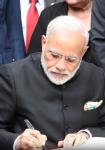Pakistan has stressed that the new government would not put on hold progress in various areas of cooperation with India because of the impasse on Kashmir.
'There are areas like trade where we feel we need to move on to the mutual benefit of both the countries,' Foreign Minister Shah Mehmood Qureshi said in an interview with Dawn News channel.
He added that the new approach should not be construed as putting the Kashmir issue on the back-burner.
'We are not forgetting it (Kashmir). It is important,' he emphasised.
At the same time, he said, Pakistan wanted regional stability, peace and greater understanding (with India) so that 'we can work together for the benefit of the region and its people'.
'We have been approaching the Kashmir issue from a particular angle and should now try a different approach,' the minister said, without explaining further what this approach should be.
Foreign secretaries of Pakistan and India will be shortly meeting to conclude the fourth round of the composite dialogue and initiate the fifth round.
Qureshi said Kashmir was on the agenda of the composite dialogue.
"It is one of the top issues after peace and security, and stability," he stressed.
He outlined regional peace and stability, increased economic activity and cordial relations as the major goals to be pursued in relations with India.
About the policy of the new government on the war on terror, the minister said it would be multiple-pronged -- politically engaging tribal elders, isolating terrorists and denying them sanctuaries.
The minister said the Pakistan People's Party-led coalition government was better placed than its predecessor to deal with the issue of terrorism.
'This government is democratically elected and it can give ownership to the war,' he said.
The previous government, he said, failed to carry the counter-terrorism agenda forward because it did not succeed in convincing the people that this was not an alien war and that it was a war affecting the common man, the country's economy and its cities.
Qureshi ruled out any drastic changes in foreign policy, saying, 'We will not be reflecting what was done in the past, nor will we be rejecting what was done in national interest.'
He claimed that the coalition government would pursue a 'balanced foreign policy', whose pillars would be regional peace, economic security of the country, protecting Pakistan's capability to deter aggression, fostering good relations with all countries, particularly its neighbours, and safeguarding the interests of expatriates.





